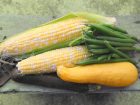By Ken Hargesheimer
Poor, unhealthy soil is the major reason for having low yields. Here is the solution:
Organic, no-till gardening–in permanent beds, using permanent paths, using hand tools. Gardening in this way takes almost no funds, increases yields 50 to 100%, allows for year round production, reduces labor 50-75%, includes no hard physical labor, reduces input/expenses to nearly 0 [seed], increases soil fertility, stops soil erosion [no rain water run off], eliminates most weed, disease and insect problems, and requires only minimal (if any) irrigation.
With organic, no-till, organic matter [green manure/cover crops, mulch] generates the following results:
- The mulch gradually rots into the soil providing a constant supply of nutrients eliminating composting.
- Moisture retention due to the mulch means reduced need for watering– saving resources and labor.
- Mulch prevents weeds from growing, reducing another laborious chore.
- Because of greater nutrients, plants can be planted twice as densely as normally recommended.
- The combination of denser spacing and healthy soil means a fourfold increase in yield.
I personally have seen successful organic, no-till gardening throughout the world: Fukaoka Farm, Japan, has been no-till [rice, small grains, vegetables] for 70 years, an Indian gardener has been no-till for 5 years, a Malawi gardener has been no-till on permanent beds for 25 years, a Honduras mini-farmer has been no-till [vegetables & fruit] on permanent beds on the contour (73° slope] for 8 years, Ruth Stout [USA] had a no-till garden for 30 years and 7,000 people visited it.
Here are the facts about organic, no-till gardening:
1. Healthy soil: Healthy soil produces healthy vegetables for healthy people.
2. You feed the soil; not the crops [Inorganics feed the plants and poison the soil;
organics feed the soil and promote health.]
3. Increase organic matter in the soil every year
4. Little or no external inputs
5. Leave all crop residues on top of the soil.
6. No-till: no tilling, no digging, no cultivating: Nature will till the soil using roots and
worms. No hard physical labor is needed so the elderly, children and lazy people can
garden.
7. Permanent beds
8. Permanent paths – chipped trees [free]
9. Hand tools & power-hand tools
10. 12-months of food production [hoops, hoop houses, row covers, shade cloth]
11. Organic fertilizers
12. Soil is always covered
13. Intercropping and/or crop rotation
14. Use green manures/cover crops for organic mulch
15. Use external organic matter.
16. Organic matter: Free. Delivered free? When economically feasible, transport to the
garden. Use as mulch. Bins: used pallets.
17. Composting: Not necessary except for special use. Pile excess organic matter until
used as mulch.
18. Drip irrigation [Purchase or DIY drip lines]
19. Ducks for insect control, meat and eggs. Goats for meat and milk. Poultry for eggs
and meat.
20. Animals in moveable pens over beds
21. Legumes and grasses for forage for animals
22. Imitate nature. Most gardeners fight nature. ¡Nature always wins!
The previous statements are based on the Internet, US & international agriculture magazines, experiences teaching agriculture in many countries, research and farmer experiences in those countries and a demonstration garden. They are ecologically sustainable, environmentally responsible, and socially just and economically viable. There is unlimited, documented proof.
a. http://www.rodaleinstitute.org/20101005_birke-baehr-food-fighter-and-future-farmer
b. http://blog.lochnesswatergardens.com/how-gardening-benefit/
c. Josef Graf http://evcurrentissue.blogspot.com/
The author, Ken Hargesheimer can be reached at minifarms (at) gmail
To look for locally produced and responsibly raised farm products, check out Pick-A-Pepper.com.
Similar Stories:
- Health and Environmental Hazards of GMOs: An Annotated Bibliography.
- The Shelf Life of Seeds
- Five Myths About Food Safety and Home Gardens
- Organic Gardening for Novices
- Spring Cleanup:What should I Do?




